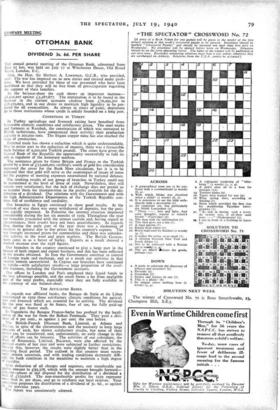COMPANY MEETING
OTTOMAN BANK
DIVIDEND 3s. 6d. PER SHARE THE annual general meeting of the Ottoman Bank, adjourned from June 25 last, was held on July 17 at Winchester House, Old Broad Street, London, E.C.
Gen. the Hon. Sir Herbert A. Lawrence, G.C.B., who presided, said: The war has imposed on us new duties and created many prob- lems. We have provided for those of our personnel who have been mobilised so that they will be free from all preoccupation regarding the support of their famillies.
In the balance-sheet the cash shows an important increase- 0,432,207 against £5,587,877. The explanation is to be found in the increase in the current accounts creditor from ,c16,295,301 to /.18,370,603, and in our desire to maintain high liquidity to be pre- pared for all eventualities. As always in times of panic, depositors go to those institutions whose credit is solidly founded on a long past.
CONDITIONS IN TURKEY
In Turkey agriculture and livestock raising have benefited from Lvourable climatic conditions and satisfactory prices. The steel works and furnaces at Karabuk, the construction of which was entrusted to British technicians, have commenced their activity; their production cop icity is 200,000 tons. The Ergani copper mine has also reached the stage of production.
External trade has shown a reduction which is quite understandable. Dne in major part to the reduction of imports, there was a favourable trade balance of 9,200,000 Turkish pounds. The crises have given the Central Bank of the Republic the opportunity successfully to fufil its tole as regulator of the monetary markets.
The assistance given by Great Britain and France to the Turkish pound by a loan of £15,000,000 sterling's worth of gold has considerably improved the cover for the Bank Note circulation, but it is to be expected that that gold will serve as the counterpart of issues of notes for the purpose of meeting expenses necessitated by national defence.
The working results of our group of branches in Turkey could not be maintained at the level of those of 1938. Nevertheless, they still remain very satisfactory, but the lack of exchange does not permit us to transfer them for incorporation in the profits available for the dis- tribution of a dividend. Our relations with the Government and with the high Administrative Departments of the Turkish Republic con- tinue full of confidence and cordiality.
Our branches in Egypt continued to show good results. At the outbreak of war there was some withdrawal of deposits, but the posi- tion rapidly Unproved. In Palestine the internal situation improved considerably during the last six months of 1939. Throughout the year our branches proceeded with the utmost caution and, having regard to circumstances, their results have not been unsatisfactory. As regards Iraq, during the early part of the year there was a slackening of business in general due to low prices for the country's exports. The war brought increased prices for commodities and there was consider- able activity in the wool and grain markets. The British Govern- ment came in as a buyer of barley. Exports as a result showed a marked increase over the 1938 figures.
Our branches in the country continued to play a large part in the finance of both import and export business, and this has been reflected in the results obtained. In Iran the Government continue to control all foreign trade and exchange, and as a result our activities in that country remain unrestricted. In Cyprus our branches have continued to handle-with satisfactory results-a large proportion of the avail- able business, including the Government accounts.
Our offices in London and Paris employed their liquid funds to the best advantage possible, and the result forms a far from negligible part of the total profits, especially since they are fully available in the currency of our balance-sheet.
THE AFFILIATED BANKS.
A, regards our affiliated banks, the Banque de Syria et du Liban experienced in 1939 those satisfactory climatic conditions for agricul- ture and livestock which are essential for its activity. The dividend for the year was fixed at 6o francs, free of tax, for fully paid-up shares of Soo francs each.
In Yugoslavia the Banque Franco-Serbe has profited by the locali- sation of the war far from the Balkan Peninsula. They paid a divi- dend of 6 per cent., as against 5 per cent. the year before.
The British-French Discount Bank, Limited, at Athens and Pirt.cus, in spite of the circumstances and the necessity to keep large amounts of each, has shown satisfactory results, but none of their profits can be transferred, and, unfortunately, no early change in this state of affairs can be foreseen. The activities of our subsidiary, the 13arll, of Roumania, Limited, Bucarest, were also affected by the Pol:Ttcal events of last year and were subjected to further restrictions. Despite this, however, the results were slightly better than in the preceding fiscal period. The outlook in that country must neces- saril: remain uncertain, and with trading conditions extremely diffi- cult the bank continues in the meantime to maintain a high degree of liquidity.
After deduction of all charges and expenses, our transferable net profits amount to £93,378, which with the amount brought forward- .09:239-places at our disposal for the distribution of a dividend a rota! of £132,618. The non-transferable profits for 1939 represent Tner. than 2s. per share, and go to reinforce our local reserves. Your sornmittee proposes the distribution of a dividend of 3s. 6d., as against acre
he !or previous years. port was unanimously adopted.


































 Previous page
Previous page